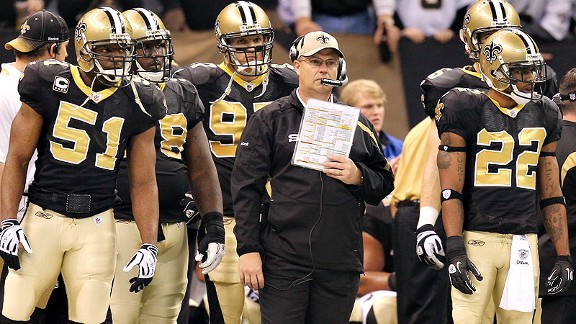Violence and drug related cheating
May 22, 2015

Creative Commons
The New Orleans Saints coach deliberates a play call during a game. The Saints were found guilty of the bounty scandal in 2009.
The 2011 “Bounty scandal” of the New Orleans Saints is a notable incident where Saints coaches gave defensive players pay bonuses, known as “bounties,” in exchange for exacting injuries upon opponents during games. According to the NFL, players from the Saints would receive $1000 for a cart-off, a hit that resulted in a player having to leave the field.
“I think what it tended to be more of was ‘Hey if you take this guy out, whether it’s for the game or a week, we’ll give you a bonus,’ ” Ashbrook said. “In the eye of an athlete, they’re not looking at it from the perspective of ‘I want to hurt this guy because I don’t like him or that person.’ It’s ‘I’m going to hurt him because I’m going to give myself and my team a better chance to win.’ ”
In addition, 2009 Saints defensive captain Jonathan Vilma was willing to offer $10 million to any player who knocked out Brett Favre, the Minnesota Vikings quarterback, during the 2010 National Football Conference (NFC) Championship game. Although the Saints did not succeed in reaching this goal, the NFL suspended Vilma for the entire 2012 season.
Player safety is already a cause of major concern, especially in the highly physical sport of football. Even with the NFL’s attempts to suppress scandals, it remains difficult to rid the sport of cheating.
“If you’re talking about cheating scandals, that comes down to the character of the program and the character of the team and the character of the players,” Varsity football player Sidhart Krishnamurthi (‘15) said. “That does not come down to the fact that there’s so much pressure to succeed. [Performance-enhancing drugs], recovery drugs, those things that are in the NFL today, I feel like those things are hard to avoid because you’re counted on to make that money.”
Besides violence, some professional athletes resort to the use of drugs. Convicted in 2013, American cyclist Lance Armstrong was stripped of seven Tour de France titles due to his use of steroids and performance-enhancing drugs.
“I understand why he would use drugs, but I don’t think it is the ethical choice,” former Varsity tennis player Alex Mo (‘17) said. “I think that it is unsportsmanlike to do that to other competitors.”
The prevalence of cheating incidents in sports has led to discussion over why professional athletes go to such lengths to perform.
“I think once you worked really hard, after a certain point, it’s harder to get stronger and harder to get faster,” Harker Varsity football player Trenton Thomas (‘16) said. “So you look for an alternative.”
Varsity swimmer Aaron Huang (‘15) believes that cheating can result from an athlete’s’ personal perception of competition.
“I believe that once sports lose their sense of fun and excitement and become simply a task or job, competition becomes burden and not a stimulus, as it should be,” he said in an email interview.